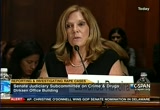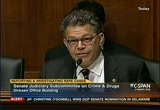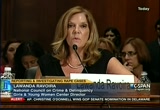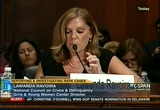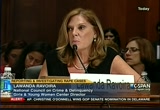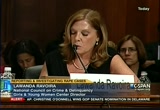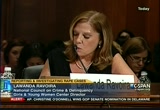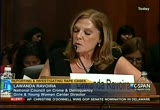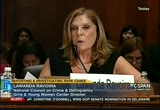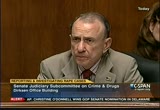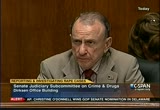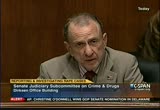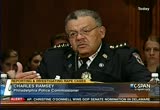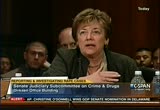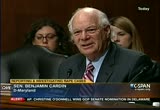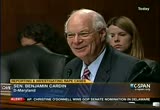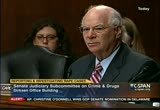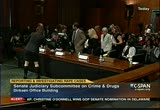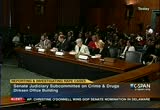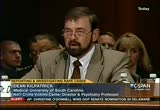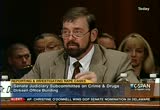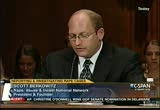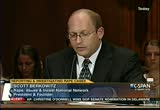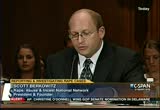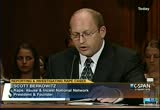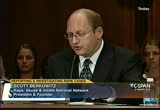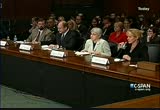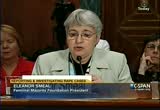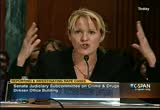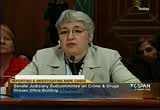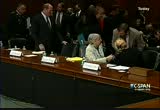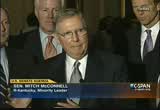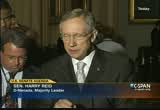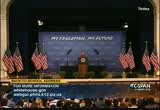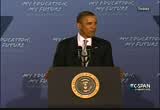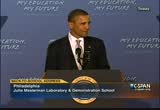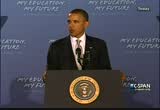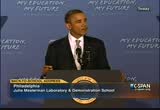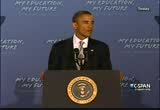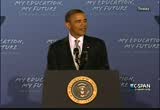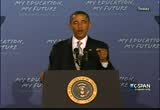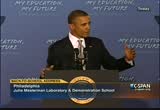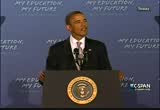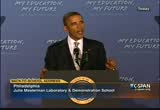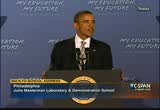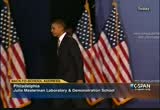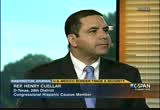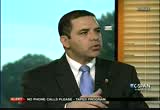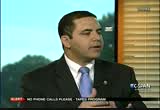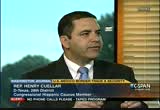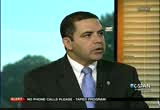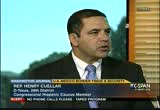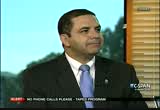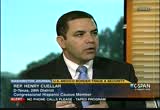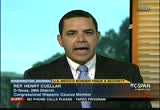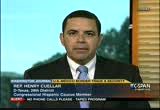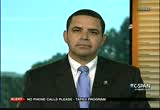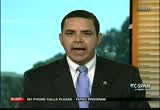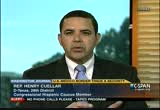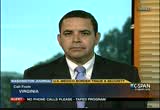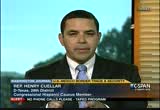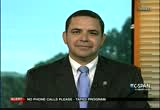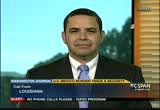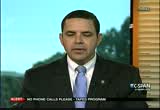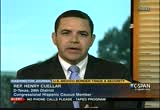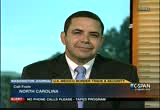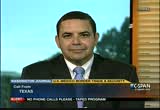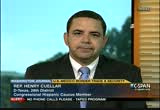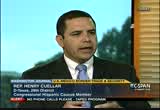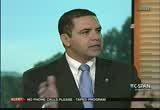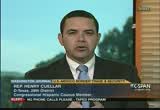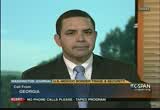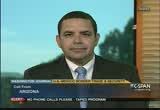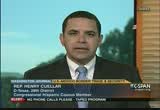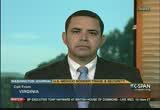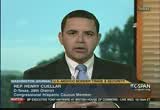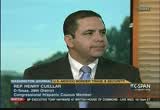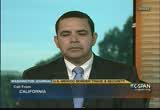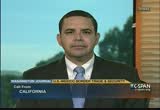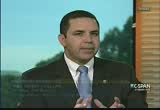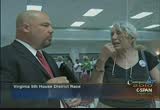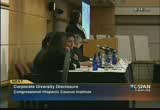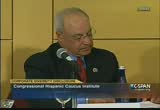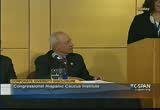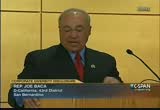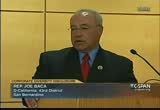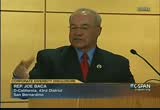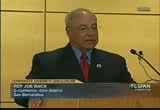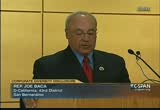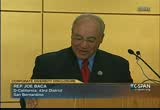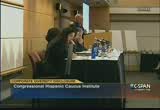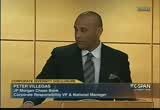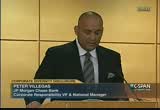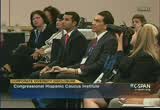tv Capital News Today CSPAN September 14, 2010 11:00pm-2:00am EDT
11:00 pm
has another commitment. >> thank you for your indulgence, chairman and dr. revora. i read your written testimony last night. i also want to thank ms. ramsey and his tracie -- miss tracey for what happened to you. it is simply horrific. i am sorry about this, but i do have to go. i just want to ask one question, that is, to miss ready. i would like to know what happened to detective edinson. i know that you have sued him and that was thrown out. that was overturned or will either likely going on or has been. was he still retained on the forest? -- on the force? >> yes, he is the lead detective. >> that, to me, is pretty amazing.
11:01 pm
i would like to thank you and miss wile for your courage and for all of the of the witnesses today, and for you miss revey for all that you do. >> the doctor may proceed. >> thank you, chairman. on behalf of the ncdc center for girls and young women, our work is about providing a girls -- a voice for girls and young women to ensure that there are appropriate responses to the treatment of girls and young women. today, i would like to give voice to a young girl named gaddy. she is a 14-year-old girl from florida who was not lucky enough to get a police officer who was willing to hear her story. you have heard the statistics throughout this hearing where one in six women will experience
11:02 pm
a rape or attempted rape in her lifetime. more than half of these rape victims will be raised before their 18th birthday. -- raped before their 18th birthday. but these statistics do not tell the whole story. ray, as you ever, is one of the most severe of all traumas. i think for a moment, the scene of the crime is the body of the survival -- of the survivor. one survivor's story paint a haunting picture of the long- term impact of rape. her name is gabby. gabby is the 14-year-old that i have had the pleasure at of knowing. she is the daughter of a migrant worker in florida. she was alone, sleeping in the bedroom, when her rapist came in through the bedroom, threatened her, took her out into the fields, and brutally raped her.
11:03 pm
she made her way back home to her mother, who did the right thing. she went to the local police department and asked for help. the police response was, what did you do to provoke this? she was sent home without support or referrals for treatment. she was terrified. for months, she did not leave her house and she slept with her mother. gabby was charged for 24 are going to school. her mother convinced her to start -- for truancy for not going to school. her mother convinced her to start sleeping in her room again, but she would take her pillow and sleep outside her mother's door because she was terrified. when she did return to our room sometime later, the rapist returned and raped her again. this time, when the mother reach out for help, the police did
11:04 pm
take a report, but little was done to find the rapist. but at least, gaddy was referred to a program for girls and young women. here she began to tell her story. she was terrified to leave because she did not know what the rapist look like and she felt like he knew who she was and could be anywhere. this trauma continues to haunt her. the staff knew that she was a classic case of posttraumatic stress disorder. she was depressed and hopeless. she was a victim twice in what some people call a secondary rape. and when she told the police, she was not free -- believed. story is the story of hundreds of girls and young women in this country. when girls make the decision to go to the police and report
11:05 pm
great, the response of the place is critical, not only to the girl, but the family. the pervasive attitude and the least by the police that inhibits their ability to -- and beliefs by the police that inhibit their ability to stop the crime, first it starts that if a weapon is not involved, then it is not as serious. 80% of sexual assault happened by someone who knows the victim. it is also quite disturbing when we know that control tactics do not always involve a weapon. that was certainly the case with gabby. she was simply threatened and terrified. also what we see is law enforcement will discourage victims from reporting, sometimes the train the personal
11:06 pm
cost to pursue repeated court tricks that can be humiliating, or they simply do not believe the victim. police also threatened the victim about being charged with a crime if there is inconsistency in their story. answer the, the advocates that i work with feel that the most egregious thing they are presented with is that they are asked to sign a waiver of prosecution if it is an acquaintance rape, which means it does not even get seen by the state's attorney. what we believe is that the police officers are not trained to conduct an appropriate investigation. >> doctor, how long? >> i just have a few recommendations. the center for girls and young woman is calling for an examination of the police culture and practices to improve the response to girls and young women.
11:07 pm
first, we believe in addition to the things that you have already heard, that there should be consequences for police officers who unfairly detained and treat victims of sexual violence as criminals. we also believe that there should be funding for more research for services for the missing voices and experiences for the harley -- the highly marginalized. >> how much longer will you need? >> about 10 seconds. these include immigrants, individuals from rural communities, lesbian, gay, bisexual and transgendered victims, survivors -- there also needs to be special attention to the rape and sexual assault of women in the military. we believe it is vital that we collect accurate information about sexual assault and the impact of police practices. it is our belief that no one
11:08 pm
should have to go through what gabby went through and what she endured and continues to deal with. she deserves better and so do all the other young women. thank you. >> miss redey, how have you faired since this terrible experience? >> i'm sorry, could you repeat that? >> heil have you been after being the victim -- how have you been after been the victim of the terrible circumstances you have described? >> how are you now? >> things are getting better. it has been a long road. i have been lucky to have a great family support me and love me. >> how can you account for the police officers still being on the force. >> i find it insulting not only to me, but the people in the community. >> mrs. wile, how are your
11:09 pm
children? >> thank you. my son was only two months old -- eight months old. he was too young to understand what was happening. it was only in the years that passed and i was too distracted and unable to be there for him. my daughter struggles with an eating disorder. although the incidences' happened on a single day, she was questioned by the attendees and the state's attorney's office, she was forced to relive it. -- by the police and the state's attorney's office, so she was forced to relive it. >> our she doing now? >> we are all getting counseling and sheet -- the future is brighter than it did. >> doctor, how is gabby? >> she is moving forward with her life, but the scars are really deep. >> did they ever catch the
11:10 pm
fellow? >> they did not. >> miss tracie, you tell about the fbi not responding. it is a very serious problem about the system, which is antiquated. i will let you know when they respond to my letter. [laughter] commissioner ramsey, your practices involving the stakeholders, as you put it, is a very good idea. tell us a little more about -- how you make the program work.
11:11 pm
you talk to the women's groups and they make recommendations as to what it should be done? >> guess, -- yes, and least once a year, 300 or 400 cases are chosen at random and we spend a few days, actually, going over these cases. particularly unfounded or exceptionally clear cases and they will find some cases where they felt there were some investigative leads that were not followed up on and so forth. the we go back and complete the investigation. there are sometimes active cases that are ongoing where we either need their assistance or they have questions for us. i think is a good check and balance. i think is the way to go. no matter how good your system may be internally, if you do not have someone from the outside
11:12 pm
that can review and critique what is your doing and always working to make it better, then it will be subject to some doubt as to whether or not you are thoroughly investigating these crimes. our job is to take the report. it does not matter what you may feel about the victim. take the report. let the investigation -- let the investigative process happen. >> we have 47 seconds left. miss tracie, in pennsylvania, you are one of my employers and in philadelphia, you are one of commissioner ramsay's employers. is he doing a good job on the subject? >> absolutely, and we are working intensively with him on domestic violence and stopping. we're putting a hole protocol -- and stocking. we are putting a hole protocol in place. -- whole protocol in place.
11:13 pm
they have been incredibly responsive to the advocacy community. >> senator gardner? >> we year the statistics and numbers and i really want to thank ms. williams for being here to put a face on the issue. and when you put -- when you hear the testimony of those who have been victimized, you realize how many families have been involved and affected by the policies and the laws that we pass and the way they are implemented. it is not easy to appear before us and i thank both of you for being here to help understand a bit better the seriousness of what we are dealing with. and as tracie and mr. ramsey, you talk about the statistical information. without the statistics you cannot allocate the resources.
11:14 pm
the police has to allocate to their resources. local governments and of course, nationally. we just do not have good statistics. we need to get beyond the way it is reported. you mentioned the uniform crime reporting. we are moving forward to implement the national reporting based system. it is more costly. we're going to need to see whether we need to do policies nationally to be sure we have this accurately done for sexual assault cases. but then you need to have a way in which you solve, a uniform and accountable system for referring the incidences that occurred. you cannot be left with the
11:15 pm
responding reece -- police officer. i'm sure they are doing incredible work, but you need to have independent, accountable reviews of what is happening for the proper referral and for providing the proper assistance to the victim. you could not have two dramatically different stories than the two people before us, both suffering from more incidents this, when fighting the system that responded to -- one fighting the system that responded. sometimes it is too long, but sometimes justice takes a long time to get to where the results should have been. obviously, we did not want this to happen at all. we want to prevent it, but in ms.s redey case, -- in thi
11:16 pm
case, you were abused twice. we need to get past that the policy in the way that the reports are handled. and that there is an accountability in the system for the way that these are referred for prosecution, so that we can evaluate what we need to do as a partner at the federal level to be sure this is handled properly. toomes tracie a about -- to miss tracie about philadelphia, you put a spotlight on it and people will respond. >> and it true not just be the responsibility of investigative reporters to look at this. in addition to the ucr not having the appropriate definition, they are not exercising their arctic
11:17 pm
responsibility. when 45 cities with -- their audit responsibility. when 45 cities half percentage is over 20%, there's something wrong with those of the cities. some cities have more unfounded then they have appropriate rates. i think we would all be happy if these were implemented throughout the country. part of the reason that we wrote the letter that we did in 2001 was because we saw it was not moving as quickly, or at all. >> i agree completely. thank you, mr. chairman. >> thank you very much, senator corian. we now turn to our next panel, dr. patrick, scott burk with, eleanor smeal, and prof. dempsey. our first witness on this panel is dr. dean kilpatrick, a
11:18 pm
professor of clinical psychology at the medical university of south carolina, director of the national crime victims center. while they are departing, i want to thank very much our first panel. ms. tracie, mr. ramsey come on tree -- mr. ramsey, ms. redey, ms. wile and dr. reavy. there are other commitments tralee after 4:00 p.m. which is requiring us to keep on a very tight schedule.
11:19 pm
>> thank you, mr. chairman and committee and i appreciate the opportunity to address the committee. i have submitted a lot of written material, which would tell you more than anyone ever wanted to know about rape statistics. go into that in any doubt at all. what i would like to say is that i think statistics are important because it provides policymakers with information that will allow us off to know whether things are changing, whether they are getting better or worse, and so we can problems liflie document what needs to be done. i have been in this field for a long time, since 1974 when i helped establish the first great crisis center in the state of
11:20 pm
south carolina. i would like to think that things have gotten better in some ways, and in some ways things have not changed at all. one of the things that has not changed significantly is improvements in the way that, particularly the fbi crime reports documents and command to law enforcement agencies about how the data are collected. i would like to associate myself with the remarks of several other people who say that there is really no excuse now not to change the way that the fbi uniform crime reports addresses the issue of rape. i would also like to talk about two studies briefly that my colleagues and i have done that have the advantage of occurring over 15 years apart. they do provide some information using some contemporary state of the art measurement in terms of
11:21 pm
the victimization survey of what actually has happened to the prevalence of rape, meaning the proportion of women who have ever been raised as well as more recent cases. to make a long story very short, i mean, what we have found is that basically, over the 15-year timeframe, if there has been no improvement at all in terms of the proportion of adult women in the u.s. who have been victims of forcible rape. in fact, it has gone up over 25%. the borden of rape -- the burden of rape on the women of america has gone up. the second, we have not found any substantial increase in the proportion of rape cases that are reported to law enforcement. everything you have heard are
11:22 pm
today have been cases that law enforcement knew about and is handled in many cases. most of the cases, in fact, many of them go unreported. no criminal justice system can address the issues of those victims if women are not -- are reluctant to come forward. thirdly, my written testimony outlines concerns that rape victims had. one of the big ones is being believed by other people, people finding out about my name. and over 60% of the victims are still saying that they are concerned about being believed and about what happens to victims after the report. the concerns of the women of america -- in america that have been raped are the same as they were 15 years ago. there has been absolutely no progress on that. finally, we found that the
11:23 pm
victim of rape increased substantially the risk of posttraumatic stress disorder, major depression, suicide attempts and alcohol and drug abuse problems. most of the people who have those problems still had them suggesting that most victims are not getting effective mental health care. in conclusion, let me just say that i really do think that the time has come for the senate to demand to that the justice department change not only the fbi uniform crime reporting system for rape, but that it also engages in and of dating of the national crime victimization survey, which will fully under measures rape. without better data on that, we will not have information on whether things are getting better off without the types of
11:24 pm
independent studies that i told you about today. thank you and i will be happy to answer questions. kristoff thank you, dr. gill patrick. -- >> thank you, dr. ken patrick. -- dr. kilpatrick. if we now turn to scott berkowitz. there -- he has a hot line that receives 95 million calls per month. the floor is yours for five minutes, mr. berkowitz. >> thank you, mr. chairman. thank you for holding this hearing. in the u.s. today, rape is a crime without consequence, access for the victim. the justice department opposing most recent -- reason estimate [inaudible] sorry. and since many reports do not
11:25 pm
lead to a an arrest and many arrests do not lead to a conviction or prison time, only one of 16 rapists will even sen -- spend just one day in prison. as long as rapists have a 94% chance of being -- of escaping punishment, they are not likely to be deterred. to accomplish a thing, it will require a sustained and focus effort to report rapes. in general, the reasons victims gave viewed in the ways society view the crime. they viewed -- they feared not been believed, they feared being interrogated their a -- about their own behavior or what they were wearing. in short, they feared they would be the one on trial. today, many victims have a
11:26 pm
greater understanding of the crime and reasons we commonly kishinev are along the lines of non wanting their loved ones knowing what happened, off -- that we commonly here now are all along the lines of not wanting their loved ones to know what happened, not wanting to relive it. while we need more training on law enforcement on treating victims of rhythm, we also need to educate victims about the importance of reporting -- off on treating victims appropriately, we also need to educate victims about the importance of reporting. the good news is that i think many police agencies have improved their handling of sex crimes in recent years, but there are still many problems in addition to the ecr encoding problems that i have discussed today. one problem is that many
11:27 pm
agencies deal with so few sexual assault cases each year, which makes it difficult to establish a protocol. one thing that law enforcement can do is establish the tools they need to successfully prosecute these cases. perception can cause problems when it is based on this information or false impressions. impressions -- misinformation or false impressions. impressions like the allegations are false true. or that the dna does not matter unless the attacker is a stranger. in fact among the best da's will tell you that having a evidence in the hand is crucial for any case these days. it can help identify serial rapist, even acquaintance rapists.
11:28 pm
we would like to see doj and the state's better track cases from an initial report of a way through this position. -- all the way through this position. there are a few things they can do right now. first, they can pass the safer route, which would create a national registry of forensics. it would provide states with crucial information about rape victims and it would help us as he was going on. -- what is going on. -- it would help us see what is going on. in the upcoming reauthorization of the justice for all act, congress should increase the funds that are spent directly on dna testing and analysis and incorporate the registry requirements of the safer act
11:29 pm
and said best practice standards for testing of all crime scene evidence. we also need to gather solid, in depth the data about the problems i have discussed today and we need your support to help fix them. and overall, for congress to move forward with the legislation in the next year, we would like to see the question becomes what will this bill do to improve the reporting and conviction rate -- rate of rape cases? at the moment, 94% get away with rape. if his deal -- history is any guide, -- >> thank you, mr. berkowitz. that we've turned out to eleanor
11:30 pm
steel, president of the national organization for women. the floor is yours for five minutes. >> thank you very much. and thank you for holding this hearing that affects the health and safety of millions of women and girls a year in the united states. and president of the feminist majority foundation and one of our major goals is to reduce violence against women. in 1995, the center established a national center -- the foundation established a national center for women in policing. the center promotes increasing numbers of women in all ranks of law enforcement, both to improve the quality for women, and to improve police response with violence against women. a f i would like to sit in my whole testimony for the record. -- i would like to submit my whole testimony for the record. >> without objection.
11:31 pm
>> thank you, i'm going to skip over my comments about rape since so much has been said about it. but i want to underscore the fact that so few are incarcerated. according to one study, it is less than 1%. let's keep that in mind. not only that, but the undetected greatest tend to be a serial rapist. two shocking studies -- undetected rapists tend to be serial rapists. two shocking studies revealed that the undetected rapists were serial rapist. most rapists are serial rapists and they were committing the bulk of their rates between 95 -- 91% and 95%. this is why great tips are so important and they are so -- kids are so important and
11:32 pm
it is one more step in the need for further investigation because if you process the kids, -- rape kits are so important because it is one more step in the need for further investigation because if you process the kits it is just one more piece of evidence that you need to prosecute. there are patterns and that these women who have been singled out, they will single out other women. research shows that nearly -- the vast majority of wage today involve both the subduing of -- of rapes today involve both the subduing of the victim and -- both physically and by of all
11:33 pm
and drugs. i want to talk about the need of recruiting women in policing. the studies show that there is a culture in the police departments that must be changed toward women. i have worked on this problem for nearly four decades. we have just not made much progress. women are still only according to the latest reports from about 12% of police department's overall, and 15% of the larger police departments. i will not give to our recommendations. the uniform crime report should include things it currently does not on rape. in fact, it is colonel knowledge -- is common knowledge, so it is omitting vaginal rate, a meeting when the victim is unconscious. it is almost ridiculous what it
11:34 pm
is omitting. it does not include rates of men. -- rapes of men. it does not include homosexual rapes. let's go on to the victimization study. it does not include children under the age of 12. and that is a large category of rape, about 25%. the federal guidelines also should be issued on how you determine unfounded cases. it is relieve definite was an unfounded case, but we know that police are essentially calling something unfounded and then if the person is found to be a serial rapist, it is harder to prosecute them for the ones that are unfounded because it is believed that it is based lessor that the victim is lying. this actually -- that is based
11:35 pm
less for that the victim is lying. this actually complicate the problem. i believe there should be federal recruitment of women police officers, and there are many ways of doing it. anchorage the recruitment of officers with the specialized -- and also encourage the recruitment of officers with the specialized training as nurses and in dealing with sexual assault. and of course, we think that the violence against women office's funding should be increased. >> how much more time will you need? >> i am ending right now. especially in the last eight years, funding has been decreased. we know that many changes should occur, but we have to start with changing the definition of rape, which is contributing to an under allocation of resources. >> the doctor, you mentioned the issue of suicide, the only
11:36 pm
person to do so. can you amplify your concerns there? to what extent is that a problem with rape victims? >> women who have been a victim of rape or 10 times more likely -- >> i have to turn to prof. dempsey. i was so busy reading her background i left her out. it very distinguished background. >> thank you, senator. >> associate professor of villanova, univ. lecturer and tutorial fellow at oxford, to read university college in london -- tutoring at university college in london. but first, your testimony, prof. dempsey. >> thank you, senator specter. and thank you for convening this hearing. going after such experienced and
11:37 pm
distinguished witnesses lead me into a position where first, i want to say, i agreed. i will try to say something that perhaps we have not touched upon quite as much. but first, i wish to place our discussion into the larger context of the criminal justice system as a whole. the failure to report and investigate rate cannot properly be understood in isolation. there are failures of prosecutors to take them to trial, failures of juries to convict and failures of justices to sentence. survivors will not report if they feel their cases will not be taken seriously by police. police will not investigate if they feel that prosecutors will not aggressively pursue charges in court. prosecutors will not aggressively pursue charges of they feel juries are likely to convict. the entire culture of the system and the way it operates will not
11:38 pm
reflect the true gravity of the offense. all this to say that the chronic failure to report and investigate rape takes place in a broader spectrum. i would like to discuss the issue of investigation, as judge carbone randy noted, the model that is going on in philadelphia -- rightly noted, the model that is going on a philadelphia is a wonderful model because it helps the victims to obtain justice, but also because it respects the rule of law. the state should be accountable to the people. what is going on in philadelphia is not only of standing in philadelphia and i am proud to be in pennsylvania and delighted that is happening, but i think it needs to be exported as aggressively as possible. with respect to the issue of
11:39 pm
police and is classifying rates -- to the issue of police ms. classifying rates as -- mis classifying rates, what is the question of non ucr rapes? i think it is ridiculous and insulting. that is to be changed. in addition, there are real problems with the and both with iucr. the only illustrations provided are stranger rape and gain weight. if there are no -- there are no explanations given to police a bad acquaintance -- about acquaintance rape and familiar
11:40 pm
rape. there is another question with respect to coding, and this comes to the fourth issue we have been asked to consider, which is the issue of police under founding rate cases. quite frequently, the ucr encourages police officers to and found police officers -- to one found -- unfound rape cases. there are only three categories. one is unfounded, which is to say no crime has occurred. the other is clear of rest, which by definition means that an arrest has been made in the case has been put forward for prosecution. and a third option is circumstances that preclude prosecution. for example, the death of the
11:41 pm
defendant or the inability to extradite the defendant to the appropriate jurisdiction. with respect to the issue of clearing a case by exceptional means, we cannot include the fact that the victim has withdrawn the corporation from a case as a means to clear a case by exceptional means. that is not legally preclude the state from going forward. the state prosecutors' crime, not the victim. -- the state prosecutes crime, not the victim. second, it is worth considering the possibility of adding a third way of disposing of a case. it could reflect that a case was founded, but rejected based on inadequate evidence. the problem with un miss a standing -- unfounding is that
11:42 pm
it encourages police officers to unfound cases and to clear them thank you. on the question of suicide, wrote to what extent -- >> thank you. on the question of suicide, to what extent is that a concern? >> it is difficult to say because we are talking to people who are still alive. but if you look at the attempted suicide, in both of the studies that we have done -- >> how about a correlation between those who commit suicide and those that are rape victims? >> unfortunately, most rapes go undetected. >> how about those that are
11:43 pm
detected? connection? cause opeal >> those who have posttraumatic stress syndrome are more likely to make suicide attempts. it is a huge risk factor. my professional opinion as a clinical psychologist is that there is a correlation there. >> you talk about changing the culture in the police departments. how do you do that? >> i think you change the educational requirements. i do think that people who are trained to in sexual assault who are social workers, nurses -- >> how do you do that with police budgets? >> unfortunately, social workers do not get paid that much, do they? >> i'm talking about education.
11:44 pm
>> as i said a graduate of the social worker class does not get paid that much. >> is it realistic in police department budgets that? >> yes, i do think is very realistic because i do not think the average social worker in the u.s. makes even as much as the average police officer today. we also have to do something about recruiting more women into policing. we have been pursuing the women's rights movement and policing sex discrimination for 40 years and we are still only a 12% of police officers. >> i'm sorry to move on, but time is very limited. mr. berkowitz, would your recommendation be about trying to get more sensitivity with the
11:45 pm
interviewers, the police officers? how do we do that in a practical sense, given the police budget limitations and that it is difficult to recruit people that have an educational background in this kind of matter? i think the training already exists. a lot of police departments have made tremendous progress on that. there is a lot of existing training that international associations, police chiefs and others offer. >> mr. m.c., i noticed one of your courses you teach feminist legal theory -- mr. dempsey, i noticed one of your courses, you teach a feminist legal theory. what is that? >> you should come to my class. >> do you need on weekends? >> we would have a special session if you wanted to attend.
11:46 pm
we discussed lot in the broader said, whether it is been made part of a positive law or not. we value of existing laws, ways to improve those laws from a feminist point of view. >> what would your advice be to women's organizations to persuade police commissioners other than commissioner ramsey to allow for transparency and for other stakeholders to be involved in reviewing these cases? >> i think there needs to be a context in which these people can sit down together. literally sitting in one forum and talking face-to-face begins to break down the myths that each side holds against each other. i am both a feminist activist and a former prosecutor and i
11:47 pm
married a police officer. i know you can bring these groups together and in my own experience as a prosecutor, we were very successful in britain and the police on board -- in bringing the police on board with the sexual assault prosecution simply because we took the time to educate the lawyers and police officers regarding the advocates concerns. >> thank you. dr. kilpatrick, mr. berkowitz, ms. neill, prof. dempsey, this is a matter of enormous importance and i regret that we have not had more time today to do with actual justice. we have not begun to scratch the surface. we have had very distinguished panel. it is insufficient to say you have five minutes, in sufficient offs -- insufficient totally.
11:48 pm
senators are interrupting because we only have a few minutes to question. but that happens to supreme court nominees as well as you folks here today. it happens to everybody. it is my hope that we will stimulate some interest by police department in this subject. there're a couple of things that i can we can do. i think we can get the fbi to change its definition. we can get the fbi to change its survey. we have oversight on the fbi from this committee. i think the director will respond. there is a lot more to rape them is in that fbi definition has outlined. and it totally eliminates the issue as to what is going on in jails across the country as to the same sex rate. -- same-sex wairape.
11:49 pm
on the issue of training, it would be good to get some federal funding to police departments. i would like to see more police departments do what you do, mr. ramsey, and i would like to see more women's organizations knocking on their doors. knock on their doors. and if they do not respond, knock on the mayor's corporatdo. you do not have to knock on my door. you can just have on it. if thank you all very much. [captioning performed by national captioning institute] [captions copyright national cable satellite corp. 2010]
11:50 pm
>> voters went to the polls in primary states today. the associated press is reporting that charlie rangel has defeated five chávez and primary there. he is currently serving his 20th term and isikoff facing violations of -- and is phasing violations of the ethics committee. we will hear from the candidates in next on c-span. after that, senators from both parties talk about their priorities. later, president obama gives a back-to-school speech to students in philadelphia. and later on washington journal, we will talk about extending the
11:51 pm
bush tax cuts. after that, pennsylvania senator arlen specter on the pentagon's plans to reduce defense spending by $100 billion over the next five years. after that, clifford rossi. "washington journal" each morning at 7:00 a.m. eastern here on c-span. later in the morning on c-span 3, bp executive tony hayward is testifying before the british house of commerce energy and climate change committee about deep water drilling. live coverage starting at about 10:00 a.m. eastern. >> the c-span networks, we provide coverage of politics, public affairs, nonfiction books and american history. it is all available to you on television, radio come on-line and off social media networking
11:52 pm
sites. you can find our content any time at c-span.org. we bring our youth resources to your community. -- we bring our of resources to our community. provided by cable as a public service. the courts again, christine o'donnell defeated -- >> again, christine o'donnell defeated mike castle congressman castle spoke to his supporters at his headquarters in delaware. >> let me just start by thanking each and every person here. that was a wonderful reception.
11:53 pm
i wonder what it would have been if i had won the doggone thing. i cannot thank you enough for the support for all of you. and you have made a huge difference as far as my life in government and the public life is concerned. i would like to thank each and every one of you. but there is no one i want to thank more than my beautiful wife carriveau [cheers and applause] -- my beautiful wife. if none of this would have been possible without her unwavering support in every way. we had a long discussion about
11:54 pm
whether i should run for the senate or not and we finally discuss if that i should. we will have a long discussion up tonight about whether there was a good decision or not. [laughter] that is a whole different story. i'm very proud of every one that has been involved in my campaign carriveau [applause] -- in my campaign. [applause] it is with great humility that i stand here tonight to thank all of you for your support. in many instances over many years, some instances more recently, but i just cannot thank you enough for your support in helping me steer the political waters out there, which sometimes can be difficult. the last weeks have been spirited, shall we say. the republican party has spoken and i respect that decision i have had the privilege, as
11:55 pm
everyone here knows, of serving in many capacities over many years now, and i love this state. we are a community that knows each other, works well together and over the years we have been able to achieve much in this state, and for that, i can say that it would not have been done without the help of each and every one of you. i have enjoyed my time in the congress of the united states. that is not to say it is not a lot of very hard work, but i have enjoyed the opportunity to serve everyone in our state. i want to particularly thank the -- this is mostly my staff here behind me on the stage. i would like to thank them as well. they have made a great difference. they are the ones that serve to you. they are the ones that answer the calls of delawareans and
11:56 pm
said, here is how you can straighten out your situation, maybe your mortgage or something of that nature. if i would like to thank all those who make up the party. i would like to thank tom wagner, why have the opportunity of appointing many years ago. he is still there and i think he is going to go on. and that is extremely important, too. i wish i could go around the room and talk about all of you individually because of the huge difference you have made in my life, and hopefully, in the life of many delawareans. i thank you for the opportunity to do that, and for that, i am extremely appreciative. i had a very nice speech prepared, hoping i would win this race, and talking about the things that we would do to create jobs and -- and decrease taxes and things that would make a difference to delawareans.
11:57 pm
i still have a little ways to go in office and i will try to carry out what i feel needs to be done. i still feel litigation in delaware is not where it should be. we-i still feel education in delaware is not where it should be. hopefully the legacy that i and all of you can leave behind will be to make sure that delaware is the single best state in which to live. my thanks again to all of you, particularly to jane, but of course, each and every one of you. i said to my staff, you are probably going to have a lot more free time in the weeks ahead. a lot of these folks have earned their free time also. hopefully, they can enjoy it. your dedication and support
11:58 pm
12:01 am
thank you. thank you so much, everyone. we worked hard to be here. i cannot thank you enough for that. ladies and gentlemen, the people of delaware have spoken. [cheering] no more politics as usual. i cannot thank you enough, because you guys a partner with me, i believe in the from the beginning, stood with me in the face of adversity and because of that, we are here tonight. you believed in me and i can not thank you enough. he was so much. i want to specifically thank all of our volunteers. we have an army of volunteers who are committed to a cause greater than themselves.
12:02 am
if i could quote christina, our volunteer coordinator -- and where is she? get over here! i read -- i think she has every single one of your phone numbers in her speed dial. she will be calling you a lot. if i could quote something that i read from her in a recent newspaper article. she said "it is more than a cause than the campaign, and the cause is restoring america are." ." [cheering] the america we are fighting for is worth restoring. i want to sit -- share a store
12:03 am
we do about a gentleman i spoke with at this felt lost named george. i cannot think everyone by name because we would be here until midnight because so many people have sacrificed so hard. but i specifically want to thank the 9/12 patriots for laying the foundation and a stirring things up in delaware. the founders of values group, and all of the delaware tea partiers groy group. you guys are the visionaries and leaders who made this possible because you rallied every day americans outside of the political establishment, brought them involved, and created a grass-roots network that made all of this possible. and i also want to thank the tea party express for getting
12:04 am
behind it -- where are they? our lawyers. and my father. [cheering] and my mother and my whole family behind me. my my mother is a spunky woman. do not ever tell you heard it cannot be done. it is a challenge to prove that it can be done. she is right. so let me tell you about george, as a reminder of what tonight is all about and what the next month and a half will be about. i sat here with at the picnic tables in the back and he told me a story about how when he came home from deployment overseas, people would spit on him. he would return in his uniform. he said that hurt, but i knew what i was fighting for and i knew the freedoms in america were worth defending even if the
12:05 am
people of at home did not understand it. what i see going on in america hurts the same way, but it is worse because it is the very people who are supposed to be protecting our freedoms that are taking them away. >> right. [applause] >> and my sister and i, we were driving home from the picnic and we were like, we have got to endure and win. we have got to work hard. i stood before most of you a little over a week ago and said, we are not in this to come close. we are in this to win. [cheers] and we are in this to win big. and win big, we did.
12:06 am
underestimate the power of we the people. [cheers and applause] we the people have our voice heard in washington, d.c., once again, because i believe this is not just about this u.s. senate race. this is about changing this system, changing the political system in delaware so that more every day americans can step up to the plate without worrying about character assassination and run for office, because we need citizen politicians in dover and in washington to get our state and our country back on track. that is what this is all about. [applause]
12:07 am
now, without all of your help and folks like george, this would not have been possible. so, you are the real winners tonight, because you have shown that we can win with the will and a determination, and it is that same determination that we will take to washington, because it will be a partnership. i can advocate for what is right to do in america, but without your help and support, that legislation will not get anywhere. so this partnership is not end on election day. it just begins on election day. now, a lot of people have already said that we cannot win the general action. [booing] i know. yes, we can! >> yes, we can!
12:08 am
yes, we can! >> right. [laughs] yes, we will. i like that. yes, we will. it is those same so-called experts who said we had no chance of winning the primary. it will be hard work, but we can win it. and yet those same people who fought against me worked just as hard for me, we will win. [applause] the common sense men and women of delaware are tired of the same old coming out of washington. they do not one more of the same. well, we are not more of the same. so hold on to your hats, folks,
12:09 am
because we are in for a fight. and everyone is already asking how we will get along tomorrow. and i say, the greater good. look to the greater good. we have to unite for the greater good of what is right in america and a united party, a united we the people, can win back our country. [applause] we do not have to wait until -- day to bury that hatchet. -- till return day to bury the hatchet. i am counting on all of you, every day americans. we won this with 1/10 of what are opponent raised. so we need more.
12:10 am
we need a lot more than that. it might only still take 1/10 of what my opponent has, but everyone who is watching, listening, go to christine2010.com and make a contribution. we will have the support we needed to hit the ground running tomorrow morning. let me remind everyone -- the other thing that the exports -- experts were talking about with the low vote numbers in delaware. it is an advantage we have. $100 is like making a $1000 contribution elsewhere. we will win this, because when this we must. and i believe we can. >> yes, we will. >> so, again, you betcha! there is another woman i have to thank. thank you, governor palin, for
12:11 am
your endorsement, because she got behind -- [cheers and applause] she got behind us a war-weary folks and gave us a boost of encouragement when we needed it, and she was of vote against the politics of personal destruction. so as we go forward, i would like to make the focus of this election about the issues. how we will get jobs back in delaware, how we will protect our security, how we will take care of our veterans, how we will make sure that future generations are not saddled with a crippling debt. so i am hoping that can be the focus of the general election, and we will be continuing to roll out our solutions and proposals for what we want to do. when i get to washington the day after election day. [applause] for those of you who might not
12:12 am
know, because this is a special election for the seat was held by joe biden, the winner can be sworn in the day after election day. and when we the people speak again in november, we will make sure that that possibility becomes a reality. and i will be serving in that lame duck session. let me close with words of wisdom from thomas jefferson. "when the people fear the government, there is turning. when the government fears the people, there is liberty." [applause] i wish you could see what i see. thank you. we stand for liberty. everyone in this room stands for
12:13 am
liberty. and we can do this. we can win in november. thank you for standing with me and standing with liberty up till now. thank you for continuing to stand with me in november. god bless you. [applause] [captioning performed by national captioning institute] [captions copyright national cable satellite corp. 2010] my lawyer! >> this week, a former republican vice presidential nominee and alaska governor sarah palin will address the i am republican party's annual ronald reagan did. we are expected to hear from senator chuck grassley and a former i am governor. live coverage begins friday at 8:00 p.m. eastern on c-span and on c-span radio and cc-
12:14 am
span.org. senate republicans said there will be no compromise on the issue of the bush-year tax cuts that expire at the end of the year. senate majority leader harry reid said the next item on the agenda will be the defense programs bill, which includes language repealing the don't ask don't tell policy on gays in the military. party leaders spoke briefly with reporters at the capitol. >> hello. good afternoon, everyone. i am sure you missed having us around the last month. we missed all of you, as well, and we are happy to be back.
12:15 am
clearly what is on everybody's mind is the impending debate over whether or not we ought to raise taxes in the middle of a recession. that will impact 50% of small business income, 25% of the work force, and i know our friends on the other side would like to say it is only 3% of small businesses will be impacted by tax increases. you should know that that is 750,000 american small businesses, among our most productive jobs-generating small businesses would be impacted by this tax increase in the middle of a recession. finally, we have a spending problem. we spend too much. we do not have a taxing problem. we do not tax to a little. and if we want to begin at to get ourselves out of this economic trough, the only way to
12:16 am
do that is to grow the private sector. we have tried the keynesian, stimulative, borrow and spend approach is for the last year and a half. it is not work. unemployment is still close to 10%. the reason for that is the private sector is stagnant. the best way to begin to get out of this is to not raise taxes on some of america's most productive, job generators. and at -- i am pleased to point out -- there are at least five democrats in the senate that agree with us, that this is a bad idea. there is bipartisan opposition to the tax increase. i hear on the house side, there is a growing number of house democrats on a letter that will be sent to the speaker. they think it is a bad idea to have a tax increase on some of our most productive businesses in the middle of a recession. with that, let me turn to the senator. >> let me touch on one element of this debate. republicans believe is wrong to raise taxes on any americans,
12:17 am
especially in this time of economic downturn. one of the arguments used by folks on the other side that we should somehow divide americans up and it is okay to raise taxes on some but not on the other is the idea that, well, some people will spend their money and that is a good way to create jobs, because if they are spending money to buy something, somebody has to make that product and, therefore, some americans will get put back to work. sometimes that happens. but their argument on the other side is, however, we do not really care about raising taxes on other people because they are simply going to save their money. why would we want to help people save money? that has no impact on the economy. they could not be more wrong. economist will tell you that it is at least as likely to spur economic growth and create jobs when people have savings as if they must spend their money.
12:18 am
the reason is simple -- the savings are invested in stocks or in bonds or in a bank, which lends money to businesses, and when you provide capital to businesses, ordinarily, what is used for is to buy equipment or to hire people. and buying equipment, of course, is the same thing as spending money, which can create jobs. the bottom line is that, whether people use their own money to buy something or to save, and that money then becomes capital for our business recovery, in either event, letting people keep more of their own money is the best way to create jobs in america and spur economic growth. >> excuse me, jon. >> during the last five weeks in tennessee, what i heard most frequently was this. it seems like almost everything the obama administration has tried to do for the last year,
12:19 am
from taxing job creators in the health care law, to making credit harder to get on main street, is throwing a wet blanket on job creation. the latest example of this is the idea of raising taxes in the middle of a recession. that is a bad idea because it makes it harder to create jobs. now, republicans are not the only ones who believe that. five senate democrats have already said so. today, a couple more senators said they thought that. house democrats are circulating that. in addition, president obama's former budget director peter said in an op-ed in "the new york times", no one wants to make an already stagnating jobs market worse over the next year or two, because that is exactly what would happen if the tax cuts expire as planned. so the republican position is increasing taxes in the middle of a recession is a bad idea, because it make it harder to
12:20 am
create jobs. >> what the american people have figured out is that washington does not have a revenue problem. as a spending problem. what most of us heard during the august break from our constituents, and i heard it in the south dakota, is that small businesses, farmers and ranchers are concerned about the tax increase the democrats have planned. and if you talk about income tax rates or capital gains tax, a dividend tax rates, the other thing i heard about in my state is that death tax. on january 1, that is set to go to $1 million exemption at the top rate of 55%. i had a farmer that i talked to that said that all you will be able to do is protect a few quarters of farmland and you will have to liquidate the rest to pay the irs. that is what is in front of the american people. that is why small-business is are so reluctant to invest capital in hiring people and buy
12:21 am
new equipment and creating jobs, because they know that tax increase coming around on january 1 is going to fly squarely at them. and i think that, if we are seriously concerned here about creating jobs, the first thing we ought to do is not raise taxes on anybody, to truly the job creators and our economy, and those are our small businesses. >> we will take questions. you're up. >> [inaudible] >> well, senator harry reid controls the schedule and he indicated that the defense authorization bill could be brought up. it will have a number of extraneous measures in it that have nothing to do with defense. it is making it needlessly controversial. so, we will have to see what happens, but we had a discussion
12:22 am
at lunch -- the democratic leader wants to put the dream act in it. he wants to have a discussion about the secret holes issue and a variety of other things that have nothing to do with defense. it has made it needlessly controversial. i cannot tell you right out easy it will be to go forward with that bill, but it has created an element of controversy that would not have been otherwise there. >> [inaudible] >> well, that is in the bill, and that is controversial. as you know, the provision in the bill involves eliminating don't ask don't tell without the study. and that has also made it pretty controversial. >> are you open to any compromise with regard to the highest tax bracket? there are some democrats that it said that they might be open to it if they see some kind of
12:23 am
indication, figuring out some way to pay for it or [inaudible] >> at the risk of being redundant, what we ought not to be doing is raising taxes on anybody in the middle of a recession. that is what we ought not to be doing. we know there is bipartisan agreement with that. that is the view that all of us have, that we should not be raising taxes on anybody in the middle of a recession. >> senator, it is possible that -- [inaudible] >> you are asking a lot of hypothetical that i will not answer. you can try and a variety of different ways. i think i have made it crystal clear. the republican conference believes that raising taxes on anybody in the middle of recession is a bad idea, it is not just us. you have five, six, seven democrats who agree with that. that is the starting place. >> are the republicans going to
12:24 am
try to force a test vote in committee by the epa carbon regulations, seeing that an energy bill is not likely to pass? >> we have already had a vote on the burkowski proposal -- the murkowski proposal. i do not know if there will be other votes while we are here this year. we had one vote under the congressional review act on the prospect of epa going forward with that kind of regulation. thanks a lot, everybody. >> welcome back, everybody.
12:25 am
a couple of issues i want to talk to about today. first, the most important thing we need to do for our economy is protect the middle class. that is what our economic plan has been about all year. we passed the small-business bill, at least the first run through. it was important. i was extremely happy as i indicated on the floor that pass. we have a few procedural roadblocks to overcome, but those should be ok, so we should finish that. as soon as the republicans allow us to do so. but particularly, the middle class is important. that is what our economic plan has been about. that is why we are fighting to create jobs. this week, small business jobs, as i indicated. that is why we will make permanent the tax rate for middle-class families. we should all agree at least on
12:26 am
this much. no matter what you think of president bush's tax breaks for millionaires and above, we can all see that the middle class could use some help. but as everyone knows, my republican colleagues are promising to hold hostage the economic security of the middle class. they are threatening, and proudly so, to raise taxes on the vast majority of americans. they say that until millionaires get what they want, the middle class will not get what they need. that is simply not just unfair to hard-working americans, it is bad economic policy for our nation and was to begin we heard our ability to make a full recovery -- this week i moved to the defense authorization bill i would hope we could move to it without having to file cloture and a motion to proceed, but howard hings have been things have be,
12:27 am
having to file cloture on more than 100 pieces of legislation, i will probably have to file cloture on that. certainly, this is an important bill. but it is especially important this year because we are going to address two issues that are long overdue. first of all, in this bill we repeal the don't ask don't tell policy. i indicated to senator mcconnell, they can have a vote to take that out. they can have a vote on it. but i think we should use common sense over discrimination. if we are going to match our policy with our principles. in our country, ever when he steps up to serve our country should be welcome. two, also, we have large numbers of our military who are hispanic. i think it is really important
12:28 am
that we move forward on this legislation. i know we cannot do a comprehensive immigration reform. i have tried so very hard. i have tried different iterations of this. but those republicans we had in the last congress have left us. the dream act is really important. what does it do? boys and girls who come to our country for 16 and to have been here for five years should be able to go to a state school. they do not get pell grants, but if they spend a couple years they can get their ged or if they have a high-school diploma, and many of them do, and complete a couple of years of college, they can have their
12:29 am
status adjusted. if they go in the military, they can get a green card. that is what the dream act is all about kids who grew up as americans should be able to get their green cards after they go to college or served in the military. these are the two amendments i told senator mcconnell but i think are essential to the defense authorization bill. it is important we get this done. questions? >> senator, sharon angle is someone who is out of the mainstream. you are the senate majority leader, a very well-known in nevada. >> i will not get into a battle of the polls here today. would you let me answer the question? thank you. i will not get into a battle of the polls here. i am satisfied. i think i have one of the finest pollsters in america, mark moment. i'm satisfied. >> senator, do you support
12:30 am
president obama's tax plan personally and would you vote for increasing taxes on families making over $250,000 a year? >> we will have the procedure during this period of time, i have worked with senator mcconnell to come up with something reasonable, that we can move forward on these tax issues. and i am happy to do that. it appears at this stage, we have two issues. one is taking care of the middle class. the other is taking care of america -- taking care of the millionaires. it is easy to understand where we are at. >> what would you support? >> i support the $250,000. >> [inaudible] >> i hope so. >> immigration reform. [inaudible] >> i do not think we should talk
12:31 am
about how beneficial the dream act is for democrats. i think we should talk about how fair is to people who should be able to go to school if they want to come and join the military if they wanted. it has nothing to do with democrats or republicans. it has everything to do with fairness. pardon me? >> [inaudible] >> we will sure find out. don't know. >> [inaudible] tax cuts for the middle class? >> i hope so. i think it will certainly be the right thing to do. only one way of finding out, and that is to take a vote on it. i think democrats all support that. >> is there a compromise? senator mcconnell said there might be a compromise. >> i don't know. he filed a bill last night here that extends all tax cuts permanently. i do not know what he is talking about as a compromise.
12:32 am
>> whether it is suspending the rest of the tax cuts temporarily. [inaudible] >> i think that it is very important we do everything we can to protect the middle class. we are united as the democratic caucus and cutting taxes on middle-class americans and small businesses. and i would hope that the republicans would not hold hostage middle-class tax cuts in order to protect these giveaways to millionaires and billionaires. >> [inaudible] have you talked to the white house about the imam? >> no. >> [inaudible] >> what? there you are. >> i'm here. >> on food safety legislation, i thought we had all that clear, but there are still republican senators saying no. we open the next 24 hours, they
12:33 am
will say yes. that is where we are. thank you, everybody. -- we hope in the next 24 hours, they will say yes. that is where we are. thank you, everybody. >> this week and on the "after words,"the conflict between a national security and the first amendment. "necessary secrets". this weekend on "book tv." >> president obama gave his second annual back-to-school speech today in philadelphia. he acknowledged the tough times that families face, but encourage students to stay and work hard in school. his remarks are 25 minutes.
12:34 am
[cheers and applause] >> good afternoon, everyone. today i would like to welcome to the masterman laboratory and demonstrations kohl, president barack obama -- to our school. it is a great honor for me to be here today, speaking for the students of my school, my city, and my country. when i first learned that i would be the one to introduce barack obama, i thought to myself, wow. i am so lucky to have this privilege. what a great year to the student body president. the truth is, i am not here by block. i am here because i had determination, because i had aspirations, because i had
12:35 am
unwavering support for my family, my friends, and my school. they have all helped me to grow and develop into i am right now. this school, this community has taught me to work, share, learn, and laugh with others. the teachers and staff had given the and all of the students here the opportunity to progress academically, emotionally, and independently. it is this sense of community, this sense of belonging bestowed upon all the students to the past three years at master man that has bred me for success, and i will settle for nothing short of that. i encourage every student to take on the same mentality. and now it is my great pleasure to introduce to you someone who has achieved the success we all hope for and gone beyond to change the very nation in which we live. ladies and gentlemen, please welcome the president of the
12:36 am
united states, mr. barack obama. [cheers and applause] >> thank you! hello! thank you. thank you. well, hello, philadelphia! and hello, masterman. it is wonderful to see all of you. what a terrific introduction by kelly. give kelly a big round of applause. i was saying backstage that when i was in high school, i could not have done that. i would have muffed it up somehow.
12:37 am
so we are so proud of you and everything that you've done. and to all the students here, i'm thrilled to be here. we've got a couple introductions i want to make. first of all, you've got the outstanding governor of pennsylvania, ed rendell, in the house. the mayor of philadelphia, michael nutter, is here. congressman chaka fattah is here. congresswoman allyson schwartz is here. your own principal, marge neff, is here. the school superintendent, arlene ackerman, is here and doing a great job.
12:38 am
and the secretary of education, arne duncan, is here. and i am here. [cheers and applause] and i am thrilled to be here. i am just so excited. i've heard such great things about what all of you are doing, both the students and the teachers and the staff here. today is about welcoming all of you, and all of america's students, back to school, even though i know you've been in school for a little bit now. and i can't think of a better place to do it than at masterman. because you are one of the best schools in philadelphia. you are a leader in helping students succeed in the classroom. just last week, you were
12:39 am
recognized by a national blue ribbon -- as a national blue ribbon school because of your record of achievement. and that is a testament to everybody here - to the students, to the parents, to the teachers, to the school leaders. it's an example of excellence that i hope communities across america can embrace. over the past few weeks, michelle and i have been getting sasha and malia ready for school. and they're excited about it. i'll bet they had the same feelings that you do -- you're a little sad to see the summer go, but you're also excited about the possibilities of a new year. the possibilities of building new friendships and strengthening old ones, of joining a school club, or trying out for a team. the possibilities of growing into a better student and a better person and making not just your family proud but
12:40 am
making yourself proud. but i know some of you may also be a little nervous about starting a new school year. maybe you're making the jump from elementary to middle school, or from middle school to high school, and you're worried about what that's going to be like. maybe you're starting a new school. you're not sure how you'll like it, trying to figure out how you're going to fit in. or maybe you're a senior, and you're anxious about the whole college process, about where to apply and whether you can afford to go to college. and beyond all those concerns, i know a lot of you are also feeling the strain of some difficult times. you know what's going on in the news and you also know what's going on in some of your own families. you've read about the war in afghanistan. you hear about the recession that we've been through. and sometimes maybe you're seeing the worries in your
12:41 am
parents' faces or sense it in their voice. so a lot of you as a consequence, because we're going through a tough time a country, -- as a country, are having to act a lot older than you are. you got to be strong for your family while your brother or sister is serving overseas, or you've got to look after younger siblings while your mom is working that second shift. or maybe some of you who are little bit older, you're taking on a part-time job while your dad's out of work. and that's a lot to handle. it's more than you should have to handle. and it may make you wonder at times what your own future will look like, whether you're going to be able to succeed in school, whether you should maybe set your sights a little lower, scale back your dreams. but i came to masterman to tell all of you what i think you're hearing from your principal and your superintendent, and from your parents and your teachers-- nobody gets to write your destiny but you.
12:42 am
your future is in your hands. your life is what you make of it. and nothing -- absolutely nothing -- is beyond your reach, so long as you're willing to dream big, so long as you're willing to work hard. so long as you're willing to stay focused on your education, there is not a single thing that any of you cannot accomplish, not a single thing. i believe that. and that last part is absolutely essential, that part about really working hard in school, because an education has never been more important than it is today. i'm sure there are going to be times in the months ahead when you're staying up late doing your homework or cramming for a test, or you're dragging yourself out of bed on a rainy morning and you're thinking, oh, boy, i wish maybe it was a snow day. but let me tell you, what you're doing is worth it.
12:43 am
there is nothing more important than what you're doing right now. nothing is going to have as great an impact on your success in life as your education, how you're doing in school. more and more, the kinds of opportunities that are open to you are going to be determined by how far you go in school. the farther you go in school, the farther you're going to go in life. and at a time when other countries are competing with us like never before, when students around the world in beijing, china, or bangalore, india, are working harder than ever, and doing better than ever, your success in school is not just going to determine your success, it's going to determine america's success in the 21st century. so you've got an obligation to yourselves, and america has an obligation to you, to make sure you're getting the best education possible.
12:44 am
and making sure you get that kind of education is going to take all of us working hard and all of us working hand in hand. it takes all of us in government -- from the governor to the mayor to the superintendent to the president -- all of us doing our part to prepare our students, all of them, for success in the classroom and in college and in a career. it's going to take an outstanding principal, like principal neff, and outstanding teachers like the ones you have here at masterman -- teachers who are going above and beyond the call of duty for their students. parents going to take who are committed to your education. now, that's what we have to do for you. that's our responsibility. that's our job. but you've got a job, too. you've got to show up to school on time. you've got to pay attention in your class. you've got to do your homework. you've got to study for exams.
12:45 am
you've got to stay out of trouble. you've got to instill a sense of excellence in everything that you do. that kind of discipline, that kind of drive, that kind of hard work, is absolutely essential for success. and i can speak from experience here because unlike kelly, i can't say i always had this discipline. see, i can tell she was always disciplined. i wasn't always disciplined. i wasn't always the best student when i was younger. i made my share of mistakes. i still remember a conversation i had with my mother in high school. i was kind of a goof-off. and i was about the age of some of the folks here. and my grades were slipping. i hadn't started my college applications. i was acting, as my mother put it, sort of casual about my future. i was doing good enough. i was smart enough that i could
12:46 am
kind of get by. but i wasn't really applying myself. and so i suspect this is a conversation that will sound familiar to some students and some parents here today. she decided to sit me down and said i had to change my attitude. my attitude was what i imagine every teenager's attitude is when your parents have a conversation with you like that. i was like, you know, i don't need to hear all this. i'm doing ok, i'm not flunking out. so i started to say that, and she just cut me right off. she said, you can't just sit around waiting for luck to see you through. she said, you can get into any school you want in the country if you just put in a little bit of effort. she gave me a hard look and she said, you remember what that's like? effort? some of you have had that conversation. and it was pretty jolting hearing my mother say that.
12:47 am
but eventually her words had the intended effect, because i got serious about my studies. and i started to make an effort in everything that i did. and i began to see my grades and my prospects improve. and i know that if hard work could make the difference for me, then it can make a difference for all of you. and i know that there may be some people who are skeptical about that. sometimes you may wonder if some people just aren't better at certain things. you know, well, i'm not good at math or i'm just not really interested in my science classes. and it is true that we each have our own gifts, we each have our own talents that we have to discover and nurture. not everybody is going to catch on in certain subjects as easily as others. but just because you're not the best at something today doesn't mean you can't be tomorrow.
12:48 am
even if you don't think of yourself as a math person or a science person, you can still excel in those subjects if you're willing to make the effort. and you may find out you have talents you never dreamed of. because one of the things i've discovered is excelling -- whether it's in school or in life -- isn't mainly about being smarter than everybody else. that's not really the secret to success. thanabout working harder everybody else. so don't avoid new challenges -- seek them out, step out of your comfort zone, don't be afraid to ask for help. your teachers and family are there to guide you. they want to know if you're not catching on to something because they know that if you keep on working at it, you're going to catch on. don't feel discouraged, don't give up if you don't succeed at something the first time. try again, and learn from your
12:49 am
mistakes. don't feel threatened if your friends are doing well, be proud of them, and see what lessons you can draw from what they're doing right. now, i'm sort of preaching to the choir here because i know that's the kind of culture of excellence that you promote at masterman. but i'm not just speaking to all of you, i'm speaking to kids all across the country. and i want them to all here that -- all hear that same message -- that's the kind of excellence we've got to promote in all of america's schools. that's one of the reasons why i'm announcing our second commencement challenge. some of you may have heard of this. if your school is the winner, if you show us how teachers and students and parents are all working together to prepare your kids and your school for college and a career, if you show us how you're giving back to your community and your country, then i will congratulate you in person by speaking at your commencement.
12:50 am
last year i was in michigan at kalamazoo and had just a wonderful time. although i got to admit, their graduating class was about 700 kids and my hands were really sore at the end of it because i was shaking all of them. but the truth is, an education is about more than getting into a good college. it's about more than getting a good job when you graduate. it's about giving each and every one of us the chance to fulfill our promise, and to be the best version of ourselves we can be. and part of that means treating others the way we want to be treated -- with kindness and respect. so that's something else that i want to communicate to students not just here at masterman but all across the country. sometimes kids can be mean to other kids. let's face it. we don't always treat each other with respect and kindness.
12:51 am
that's true for adults as well, by the way. and sometimes that's especially true in middle school or high school, because being a teenager isn't easy. it's a time when you're wrestling with a lot of things. when i was in my teens, i was wrestling with all sorts of questions about who i was. i had a white mother and a black father, and my father wasn't around, he had left when i was two. and so there were all kinds of issues that i was dealing with. some of you may be working through your own questions right now and coming to terms with what makes you different. and i know that figuring out all of that can be even more difficult when you've got bullies in a class who try to use those differences to pick on you or poke fun at you, to make you feel bad about yourself. and in some places, the problem is even more serious. there are neighborhoods in my hometown of chicago, and there are neighborhoods right here in philadelphia where kids are
12:52 am
doing each other serious harm. so, what i want to say to every kid, every young person -- what i want all of you -- if you take away one thing from my speech, i want you to take away the notion that life is precious, and part of what makes it so wonderful is its diversity, that all of us are different. and we shouldn't be embarrassed by the things that make us different. we should be proud of them, because it's the thing that makes us different that makes us who we are, that makes us unique. and the strength and character of this country has always come from our ability to recognize -- no matter who we are, no matter where we come from, no matter what we look like, no matter what abilities we have -- to recognize ourselves in each other. i was reminded of that idea the other day when i read a letter from tamerria robinson.
12:53 am
she's a 12-year-old girl in georgia. and she told me about how hard she works and about all the community service she does with her brother. and she wrote, "i try to achieve my dreams and help others do the same." "that," she said, "is how the world should work." that's a pretty good motto. i work hard to achieve my goals and then i try to help others to achieve their goals. and i agree with tamerria. that's how the world should work. but it's only going to work that way if all of you get in good habits while you're in school. so, yes, each of us need to work hard. we all have to take responsibilities for our own education. we need to take responsibility for our own lives. but what makes us who we are is that here, in this country, in the united states of america, we don't just reach for our own dreams, we try to help others do the same. this is a country that gives all its daughters and all of its
12:54 am
sons a fair chance, a chance to make the most of their lives and fulfill their god-given potential. and i'm absolutely confident that if all of our students -- here at masterman and across this country -- keep doing their part, if you guys work hard and you're focused on your education, you keep fighting for your dreams and then you help each other reach each other's dreams, then you're not only going to succeed this year, you're going to succeed for the rest of your lives. and that means america will succeed in the 21st century. so my main message to all of you here today -- i couldn't be prouder of you. keep it up. all of you i know are going to do great things in the future. and maybe some time in the 21st century, it's going to be one of you that's standing up here speaking to a group of kids as president of the united states. thank you. god bless you, and god bless the united states of america. thank you. [cheers and applause]
12:58 am
>> this week, former republican vice presidential nominee and alaska governor sarah palin will address the iowwa republican party's annual rate in dinner. we are still expected to hear from chuck grassley anat the reagan dinner. coverage begins on friday at 8:00 p.m., eastern, on c-span and at c-span.org. up next, a conversation on border security.
12:59 am
from "washington journal", this is 40 minutes. . . us is the democratic representative of texas, member of the hispanic caucus, henry cuellar. tell us about the speeches about cross border trade with mexico, and why is it that you're speaking about that issue, and its exact on your district. >> well, first of all, we got to keep in mind every day the quhithes united states and mexico have about a billion dollars of trade every day. that means our economy and their economy has great impact. if you look at creating jobs, the exporting -- texas is the number one exporting state in the country and we get 13,00018-wheelers of trade a day.
1:00 am
host: so why give this speech today? and what are you hoping comes out of it? are you pushing the president on this? >> well, one of the things we want to emphasize is trade is important. we want to see fair trade. nafta, even though it's been controversial, i'm a supporter of nafta. certainly we have other agreements out there still pending. we have panama, columbia, south korea. we have other pending agreements. but we need to make sure that we work out those trade agreements where it's fair to the united states but trade is not going to stop. if the united states doesn't get into those trade agreements, other countries will. host: how has your cross border trade been exacted? >> well, our economy is doing better. texas is doing better overall than other states. our local economy is doing better because we have the energy industry.
1:01 am
but trade is important to us. even though some of the scrls across the river has slowed, the tourism -- our economy is one of the better in texas. host: are you seeing violence in your area or people not coming into your area because of the reports of violence? guest: well, if you look at the local, state and federal officials have pretty much prevented that. but one of the things i've seen when i talk to people from mcalan to loredo, mexicans are afraid to come over, because they are afraid to get caught in the crossfire. so if they don't come over to shop and spend time in our holes, it's going to have an impact on us. it has. but we're hoping that the plan and mexico wins the war that they are in right now with the bad guys, and eventually we'll
1:02 am
get that trade back. host: however, have you seen that there's been an impact with the tighter immigration laws, the one passed in arizona. there's about 20 other states looking at tougher immigration laws. is that also having an impact? >> well, one of the things we're seeing. i have friends that live in mexico and certainly know what's happening in arizona and other states and look at states that are friendly like texas where you enforce the border but don't go to a certain extent. i'm one of those that believe in full comprehensive immigration -- you have to have a guest worker plan. then the third part, which is the most controversial is what do you do about the is 1 million undocumented aliens we have.
1:03 am
i'd rather have one national plan than 50 different types of immigration plans. host: so on the immigration bill, if there is one, your committee would have 1/3 of that legislation. what do you want to do on border security? >> well, first of all, we have to have smart border security. by that, i mean, you have to have the right balance of personnel, technology and operation to make sure we do this. one of the things i've seen on the border, for example, i've been one of the strong proponents of making sure we have the predators, the drones. in fact,, we were down there to launch the first one from texas. so therefore you've got to have the right technology an personnel and at the same time the operations. but one thing i am a big blover in, you've got to get the mexicans involved where they do their sheraton other side. >> what does that sflolve >> control northern border.
1:04 am
their northern border which is our southern border. host: how? guest: help set up an immigration patrol for their side where we work with them so we can control the border on both sides. we on one side and the mexicans on the other side. host: mid terms in perle. immigration bill, says the republican route would rush in amateurs -- a changing of the guard that could can doom president barack obama's already faint chance of passing immigration reform in his first term. guest: well, you've got to look at history. in 1986 democratic republican president reagan who passed immigration. in 2006 the senate, controlled by republicans did pass a bill over to the house. the house didn't do it. but the senate did did. it was senate controlled so i still think when it comes to
1:05 am
immigration reform, we can find a bipartisan way. might not be the way the democrats or republicans want it, but i think we can pass an immigration bill in a bipartisan way. it will be difficult. i understand that. but i think it's possible. host: where can democrats compromise? guest: well, the $600 million we just added is one of the largest institutions for border security we've seen. guest worker plan, i think we can agree on a guest-worker plan. the third part is what do we do with the millions undocumented? i don't believe in amnesty like president obama. but we got to find a way to take those folks out of the shadows and the ones that are criminals, i'll be the first one to say get them out of here. but the most controversial is address the 11 million or 12 million. that's not going away.
1:06 am
host: congress henry cuellar is speaking today at the congressional hispanic caucus institute which we are covering. for more information on that go to c-span.org. the president is also expected to speak before the institute. what do you want to hear him say specifically, when it comes to push ang immigration bill? >> we want to see a concrete plan on when he intends to really push for this, because we've been talking about immigration reform. in fact, we met with them in april of 2009. when he said he was going to help us on this, and he said that certain things had to be addressed. the financial bill. the other bills and so there's been a couple things that have popped up, but eventually we have to address immigration reform. i understand there's windows. as we get too close to elections.
1:07 am
i understand it's too hard. as we get close is to elections in 2012 the windows are going to close. if we don't take advantage, -- host: where do you see the windows? lame duck session? guest: yes. but also 2011. once you get to the beginning of 2012, it's gone. host: what do you hear about the possibilities of a lame duck session? guest: i think what happens on the november elexes, and what the moods are. i remember in 2006 when the republicans lost they said eh, we'll wait until the democrats take over. we don't know what will happen but state power, by small majority, we will. so a lot depends on what happens in november. but it's not going to go away. immigration reform we have to address. but let's get the emotions out of it. let's do it in a very stable way. host: if the republicans take the house, do you think it's
1:08 am
appropriate for democrats to try to push through legislation the voters voted against during the lame duck session? >> you're in session until the time somebody else is sworn in. so it depends son what the leadership wants to do here. but i've seen this both on republicans and democrats. it's not an democratic issue. it's an issue. you're in power until somebody else is sworn in. host: william? you're up first new york on the republican line. caller: yes. congressman, according to the d.e.a., 60% of the cartel's profits, for that reason, don't you feel we should foster a debate on the legalization of marion to cut out the cartel's profit ins that regard? >> again, i'm one of those strong law and order where i don't believe in legalizing any
1:09 am
drugs. i know california and other states are doing that, but i think there's other ways we can address this. not only law enforcement, but the education, the rehab of it. states are debating this. california certainly one of them. host: we'll go on to manhattan. travis on the republican line. caller: c-span guest: c-span caller: i just got back. they told me on good authority the mayor of juarez spends every night in el paso for safety. do you know anything about that? is guest: i can tell you exactly what he does, but i do tell you they have killed some mayors. the mayor that is have not cooperated with the drug cartels. i've said mexico is where columbia wars in the 1980's, at first it was bad guys killing bad guys. now they are moving into areas
1:10 am
where they are killing mayors. they killed cantu, the person who was about to become the governor. so they are going to another extent and using the car bombs as we've seen recently. so i'm concerned about what's happening there in mexico. we have to keep in mind we have a 2,000-mile border in mexico and we have to makes sure it's to our interest and the united states that we help mexico win the war they are in right now. host: california, howard on the republican line. caller: good morning commoonks. guest: good morning. caller: your president and party has politicized this to a point where it is not going to happen. when you talk about redoing the immigration bill, the fact of the matter is there's nothing wrong with the immigration bill we have now. after ronald reagan's sorry mess of creating amnesty, the
1:11 am
people of this country, and many hispanics say no mas. that is political fair to cracker. you can wait until 2018. it's not going to change. what we need to do is enforce the immigration bill we have now. for the president to sue arizona because arizona wants to protect its own citizens is crazy. now i know your argument is that the immigration bill, though the immigration policy is a federal policy. but, the fact of the matter is the people of this country do not believe the president when it comes to immigration and many other. host: ok. congressman? guest: well, i do agree with
1:12 am
you the amnesty the president had in 1986 is something we should not repeat. but when you look at immigration, all across the world, you know, we've had movement of people from one part of the world to another part because of war, because of economics, because of famine and different reasons. we're seeing the same thing in the united states where people are coming in mainly for jobs although that has slowed down right now. but we have to look at immigration reform. yoo looked at one good part. no matter whether we do it or it's now or two years from now or a lame duck session, it's going to be emotional. if you look at debates, they have always been emotional in the germans, chinese, hispanics, it's always been emotional. we just got to make sure that if we have immigration reform, we do the border security,
1:13 am
guest-worker plan and what do we do about the millions of undocumented aliens? you hit one part i agree with. we got to enforce the laws. not all of the people here crossed the river. in fact, some of them, i think 40% of them got here legally through a permit or visa but overstayed their time and nobody told them to leave. so enforcing the law is correct. host: on the democratic line. good morning. caller: kudos to c-span. my question/concern is about the -- i think you're saying about 9 million to 11 million immigrants and the speaker you had on before was talking about the 1099 law that's probably going to kick it in or something like that. but i have a question if there's been any thought of implementing or do you think
1:14 am
the implementation of a flat tax would help the immediate problem, as far as the economics, with having that many illegals in the country yet not feeding into the system? since we're in such dynamic times in trying to keep up with the numbers and what not, wouldn't that be a clean approach to at least get the economic infrastructure back into some sort of a balance, and then we can relax and deal with the problem in a very diplomatic way? >> congressman? >> well, you're letting two issues that would bring debate. taxation and immigration reform. but as to i guess your qui is going to be dig a little deeper as are they paying their taxes and whether a taxing system would work better. we've got to keep in mind that first of all, if -- beyond the
1:15 am
t documented aliens, there's part of a trust fund that aren't going to be paid by them but -- those are numbers we see, but i guess the part is if you have 11 million or 12 million undocumented aliens, are they paying their fair share? this is why not going to an amnesty but we need to get them where they start paying taxes and learn english so they follow the rules and laws of the united states of america and there's certain things we have to look at. i understand the issue you're addressing, but first we got to address the issue of immigration rem and like the gentleman said before, no matter how we address it. it's an emotional she. if you think health care is emotional, wait until you start talking about immigration reform. host: on the republican line, james? are you there? one last call for james?
1:16 am
moving on. new orleans. caller: i thank you first. host: ok. caller: yes, ma'am, i am. you're on the air, jails. please go ahead. host: i'm going to put you on hold. new orleans, katherine on the independent line, go ahead. caller: hi. i need find -- i saw you from the 28th district. but i need to know what towns does that cover? host: and katherine, if you look at the screen while the congressman is talking. caller: my eyes aren't that good, hon. just tell me. guest: we got loredo, mcal in, san antonio. caller: i live there by edinburg, i built a house eend property there for a while. i sold it a while back. so let me tell you something,
1:17 am
darling, i am a blond-haired, you know, green-eyed person. i was -- so many times with people cursing me out from mess cans, ok? but there was a program -- i don't know if it was a program or whatever. they walked across the bridge. but you know what? they went back that night. but the people that were -- that came to me with complaints, because i was a directorate a hospital. and the people that came to me with complaints were mexicans -americans whose parents came over 40-50 years ago but became americans. and these people came over and say kathy, we are so upset, because these people coming over, they don't have to fill out any papers.
1:18 am
they don't have to abide by any laws. they just come over, and you know how much the hospital was paying those people? maybe $2 an hour. usually $.50 an hour, and they worked 18-20 hours a day. guest: first of all, i'm very familiar with the area you're talking about since i represent part of that. but let me first stai say this. a guest-worker plan. i think that's what you were talking about. some of them are not supposed to be working over here. but nevertheless, it -- a guest-worker plan as a friend of mine said, it would help us control the border, because if you know who comes in, who works? who goes back at the end of the day, then you can focus on the bad guys trying to come across. so a guest-worker plan like
1:19 am
copsman blake has said would help us control the border, and i totally agrow with him on that part. so we got to have a guest-worker plan so we know who works and then you bring up reports. it's interesting what you said about hispanics. do hispanics support immigration reform? some do and some don't. this is why i don't believe in amnesty. because my father was born in mexico, became a legalized citizen and followed rules to get here and what folks don't like is when somebody comes in, go in, get the amnesty and therefore jump ahead of the line and that's one of the strong reasons why i don't support amnesty, but to have them follow, get at the end of the line and then fall some way where they can get out of the shadows. host: kokomo, indiana? caller: yes, ma'am. host: go ahead.
1:20 am
caller: congressman, i have only one simple question. do the american taxpayer have to pay for all these illegal mexicans that come here and get pregnant. that's the reality. that's the truth. they come here, that's the only thing. get pregnant, and they have kids, and the u.s. american taxpayers have to pay for it. are you in favor of this? guest: ha ha, of course, the answer is no to that. but thank you for your question. look, let me say this, and i don't know if you were trying to go into the argument of the anchor baby. but if we enforce the law in a smart way, then we can go ahead and prevent the situations you're talking about. we certainly want to make sure we prevent the situations you're talking about, but the only way we can do that is if we enforce the border security laws we have. two, the changes we fight need
1:21 am
to address or give our border security folks powers to do what they need to do and that's support the border. host: dallas? are you with us? leon, i don't know which line you were on. i'm moving to north carolina. clyde? republican line. go ahead. caller: yeah. congressman i'm not from where you're from but where i live there's no citizens or aliens here, my neighbors are both kinds of people and good folks and that's all they can be and if you're going to tell them folks just can't be folks then i'm going to tell you it's damn -- get down over there, people are trying to sleep in here! host: susan, pass dina, texas. susan? you're on the air with the congressman. caller: yes. i wanted to -- the other guy
1:22 am
was talking about the people that come across the border, as far as i'm concerned, i don't mind that. i just wish they would get the rights like i have them, like we need to -- i would like for them to learn english like we did when we were young and i would like for them to get their drivers license in english instead of spanish because half the time when they are driving they don't know thousand read the signs and when i was very young, i had to learn how to do that. if we learn thousand use our english and spanish language, they need to do the same thing, and i think we would avoid all this confusing. and another thing, there's a lot of peel that go to the food stamps and get a lot of money, and they do have three or four or five kids. sometimes more than that. and they often say they get money, and that's why they get money, because they get so much
1:23 am
money, and they don't have to work as hard as we do. host: congressman? guest: i would address some of the points you make. i'm one of those people who are able to go out and work and not just get the benefits just because they can, so i believe in welfare reform. i did that in the stocks. -- in the state of texas. secondly, it should be english-plus. when they say english-only, i have a problem with that. but if you're an hispanic, learn english not to forget the spanish. don't forget the spanish, because it's good to know over languages. but as people become -- some how they come into the system, we got to make sure they learn english and fall follow the rules and laws of the united
1:24 am
states of america. host: rarkse lawrence, independent line? caller: yes. i think the whole problem with this is you've got a lot of people, they just don't like hispanics. hatred toward hispanics. like hatred toward african-americans. the way to solve the problem is to get all the illegal hispanics and vote democratic. host: congressman, what about campaign 2010 and 20 12 and the impact of laws like the arizona immigration law on the elections? guest: well, without a doubt, i think for hispanics that will determine mostly for a lot of them which way they are going to be voting whether it's democrat or republican. . .
1:25 am
1:26 am
>> i represent my area. immigration is important, but what is important is, are waiting -- are we in particular to our area? the economy is number one concern. polls that we have done, economy is at the top. host: even for hispanic voters? guest: that is right. and i represent a hispanic district. over 73% hispanic. host: wade, republican line, go ahead. guest: i am trying to figure out why mexico and their president don't do something for their people rather than putting the burden on us in the united states. guest: one of the things that mexico has been doing under president calderon is pushing hard to make sure that they win
1:27 am
this war that they have against the drug cartels. it is a very difficult situation, where columbia was in the 1980's and 1990's. we see two things here. there are not sufficient jobs in mexico. when there are jobs here, people will come here like a magnet. when you look at the process over the last couple of years, there has been a reduction. two reasons, the first is the economy, the second is the stronger security that we provided on the border. host: woodstock, georgia. go ahead. caller: this is something you do not hear a lot about, but when it comes to illegals using state -- fake social security cards and numbers, when they have withholding, they never get that
1:28 am
back. i am wondering if there has been a study as to how much money the government collects from these people that they never even asked for back. thank you. guest: i think the last time i saw some numbers it was over $4 billion in the social security trust fund that they will not be asked for. that is why a few minutes ago i said that they are helping us out with social security, adding money into the social security trust fund that they will not be asking for. but the best way is no amnesty towards undocumented aliens, but somehow we need to take another shot at the legalization process, getting them out of the shadows is important. host: richard is a republican in miami, ariz., go ahead. caller: how are you?
1:29 am
as far as what is happening in arizona, my question would be, what is your view on possibly recruiting federal funding for those that violate and do not enforce the laws? not amnesty, but bringing them into compliance. are you going to penalize employers? guest: comprehensive immigration reform should penalize employers that hire large numbers of undocumented aliens. sanctuary areas? i do not believe in them. as the chairman of the border security, i do not think that we should have sanctuary cities. how will we penalize them for
1:30 am
what we do to gain compliance is something that we have to debate about, but i do not believe in sanctuaries. host: alexandria, virginia. oscar, democratic line. caller: i just came to the united states. i am a legal resident now. before people talk about the eagles not paying taxes -- talk about illegals not paying taxes , we do not steal the numbers, we just invent them. in my case i work for seven years with a fake number that they took.
1:31 am
for seven years i have worked, i will never get the money with my three jobs and we do pay taxes. inform yourself. you will understand that most undocumented people do pay taxes. make sure that the criminals do not get any identification in your passage of this law. the people that have worked really hard to put food on the table for their families, but they wanted an opportunity. forgive them. those k -- host: ok. congressman?
1:32 am
guest: becoming a naturalized citizen, i understand what he is saying. but what you are saying validates what i have been saying. looking as social security, the last numbers i saw were over $4 billion there, people like yourselves that i put money in and probably will love be able to use the dollars, they will be used by other folks. on the other side, if someone has a criminal record, those of the first vogue's we should go to. we have been working with the assistant secretary of ice where they have been supporting more and more criminals. so, that is one thing we have to look at, going after those undocumented aliens that have criminal records that should be moved from here. host: atlanta, georgia,
1:33 am
republican line, good morning. caller: hello, i would like to -- i am not hearing anything. host: we can hear you, bill, can you hear us? caller: across the border, why not put a bar code on that in a number that will identify them, we can check where they go in and out. also, make the report -- make the employer report to the border and use that number to identify the employer. host: an idea like that is something we would have to look at. look, we have got to keep in mind that the guest worker plan has worked. after world war ii, when many people went out to fight, there
1:34 am
were not enough people to work in agriculture. the united states turned to mexico for a guest worker plan where they would come in, work, and return. how we identify them and the responsibilities that we put on the individual is something that we can do. just let the congressman said, it will help us to control the border, because we know who is coming in to do legitimate work and we can then focus on the bad guys and put the priority on the bad guys. host: before we wrap up, we should talk politics. we have seen some advertisements being run against nancy pelosi out there. if democrats lose the house, republicans take over. do you think that there should
1:35 am
be a change of leadership at the top, including nancy pelosi? guest: certainly i do not think that we will lose the house. once you look at the individual members, we will win the house. it might be by a small majority. but i am hoping that -- one of the things i have always said is that we have got to govern more from the center. i said this in 2006 when we took over. we can lose the house if we go too far to the left. we saw the republicans getting kicked out when they went to the extreme. we could keep his majority as long as we do not go too far to the left. i hope that we do not get to that point, but i hope that as we enter this new year to restore power, that we govern more from the center. the american people has a way of purging out the extreme right and left and i hope that we can
1:36 am
use this to have more governing from the middle. host: 73% or more of your district is hispanic. are hispanics in general moderate? centrist? guest: some people think that if you are hispanic, you are liberal, but hispanics are pretty conservatives in a lot of areas. therefore my district, even though it is hispanic, is a moderate centrist district. this is why was listed as the second most centrist member in congress, simply because of the members of my district. host: rosa, go ahead. caller: i would like to let you know that i was married to a homeland security officer. what happened is that a lot of people -- i become a u.s. citizen. i went to school. i see a lot of young people, they come over and they just
1:37 am
work the system. not only that, what they should do is the importation, get them to come over to work, pay taxes -- what they should do is deportation, then get them to come over to work, pay taxes. we need some money in the taxes system. in social security. if we do not think about it, they are working. that way we can develop social security systems in the united states. i am very proud to be become a u.s. citizen and am proud of this country. what people has to do is to think about it, they are working to pay social security. i applied for disability, i went to our supervisor, i worked all my years since i was 16. in 57.
1:38 am
they did not want to give me my disability. for heaven's sake. host: last phone call, go ahead. guest: certainly the people that want to come in for legitimate purposes, they want to work, i know emigrants that want to work hard. that is why a good guest worker plan for the federal program, one that was set up years ago and expanded upon, i think we need to do that. it is important to address the issues we have. if americans do not want to do it, the guest workers want to do it, but we have got to know who comes in and who goes out. keep in mind that over 40% of the people here legally got here through a
1:39 am
1:40 am
live coverage starts to 1015 eastern. >> c-span is traveling the country, visiting district as we look at some of the most closely-contested house races leading up to the midterm election. >> first and foremost is the radio that we have the old agenda, and a lot of what i have spent time doing is trying to get washington to focus on building things in america again.
1:41 am
>> the challenger is a republican state senator from the southern part of the district and jeff parker, a tea party member and a man from the area. the race is given a lot of national attention common because he is one of the most vulnerable in congress. he has voted in favor of obama's major initiatives, and two years ago, he was elected by the smallest margin of any race in the country. the democrats say he is a fighter and a tough campaigner and because he supported the
1:42 am
same initiative, he is given the support of national democrats, just as republicans are trying to take him down. in 2008 he challenged the six- term member and beat him. this is the closest margin of any race in congress. some people say he rode in on the obama ways, but the virginia district is fairly conservative, and mccain won it said year, so it is traditionally our republican stronghold. it is the republican district represented by a democrat. the district is the size of new
1:43 am
1:44 am
tom is a moderate democrat. on some of the big tickets, he voted in favor. he voted in favor of the clean energy bill, the economic stimulus bill, so some people say he is a liberal democrat, but he does not believe the assault weapons ban should be read implemented. he voted against both budgets because he felt they did not go far enough.
1:45 am
the other has been endorsed by organizations. if he was to be an elected, he would be looking at tax burdens. his record has been fairly mixed. he did break with his party and voted for a $1.4 billion tax increase. he took a lot of heat for that, and during the republican primary as well. he talks about creeping socialism taking over the country. he also has to run against an
1:46 am
establishment republican. while they are still working out whether or not he will be included from now on or not common-law -- or not, it is difficult for him. the polls show he is down and robert hurd has a sizable lead. he came back to win it, so if there is anything we know, it is that things can change quickly. it might be more competitive than it appears triggered >> -- then it appears. >> now i discussion on diversity in the workplace.
1:47 am
1:48 am
1:49 am
influential hispanic leaders in america. i would like to thank him for his continuing support and for hosting the important summit today. [applause] >> thank you very much for the kind introduction, and i would like to welcome you to the task force. i represent the district in southern california. those people that think l.a. has the power, people in the inland empire have more influence. i chaired the task force on corporate america, and we have a
1:50 am
task force made up of individuals throughout washington, d.c., that aren't members of the task force. when you look at corporate america and you start looking at the emphasis on small businesses and what is going on, but when you look get corporate america, and you look of the immediate area, and that is where the future is going to be for the next generation of leaders. it is going to be those kinds of positions that will be available, and our responsibility is to make sure more hispanics are appointed to the board of directors so when you look at the young generation of the individuals now getting their degrees and working for
1:51 am
corporate america, they would like to look a possibility of being a chairman or on the board of corporate america, and that becomes important, because they can set the tone. how do they cater to our communities, because we represent about 1.8% of the purchasing power. the belief is that we will be a larger market. how do you deal with the hispanic community bowman our responsibility is looking at executives managerial positions. how many latinos look for -- look like us? that becomes important to a lot of us when we look at corporate
1:52 am
america and executives that are there and managerial positions, and then when you look at procurement, how many contracts are going out to the latino community within our area? are we getting our fair share in the needed areas? are we getting the kind of advertisements that are reflected in the community? when you look at what is going on in terms of media, are we getting our fair share in terms of dollars? 1.8 trillion dollars in purchasing power. we have to provide a service to a lot of our community, and the
1:53 am
services we give in terms of scholarships and many other nonprofit organizations within our community, the need to support, and that is where philanthropy comes in. that is where our goals are. i stated before the face of corporate america reflects the united states of america. wouldn't you like it to be that way? i want to see somebody who looks like me, because i know they are sensitive to me. it becomes very important to have individuals in those kinds of positions. we will talk about that later on. we need to work to increase the
1:54 am
support of hispanic communities, hispanic organizations, and the other areas to better cultivates partnerships and advance the hispanic community, and i think if we collaborate common -- if we collaborate, we can have a better quality of life common and many individuals -- quality of life, and many individuals, it is good to know there are opportunities to help those companies advance based on the population as well, so that becomes part of the task, but before we begin talking about the task force, i would like to thank one of our sponsors, and that is jpmorgan chase.
1:55 am
we have representatives from the inland empire. the president of j.p. morgan -- he is from the inland empire. i just wanted to mention that. we have power in our area, but we have to go to l.a. to tell them how to run their business. i would like to give him a few minutes to give an opportunity to share a few words, but i want to thank him for being our role model, because this means the doors are beginning to open for us. now a lot of the intern'ns, you
1:56 am
are seeing the window of opportunity is there, and can you help me? [applause] >> good morning, everyone. thanks for being here to discuss corporate america. i have had the pleasure to witness his leadership, and he has always held the interest of the citizens, what is best for the community, and one thing he has always touched on has been corporate america inclusion and quality, so thank you for your countless years of leadership. we are happy to sponsor this panel, and we are happy to participate in the corporate diversity survey, which is one
1:57 am
of the times we have participated. we felt it was important to engage and show we want to be part of the community. we were able to highlight a couple of things like the employee network groups. evewe must develop leadership. we must recruit, retain, and of the so we can grow, so when you face corporate america, you have the talent. we were also able to highlight that we have over 1400 hispanic branches throughout the country, which means they cater specifically to the markets they are in, in language branches
1:58 am
that help the consumers with their brain king needs. -- banking needs. you heard about the miami heat. there are no miami heat fans here i guess. it is not enough just to say we are here. and we have to have the talent that can help move the company as our community is becoming one of the most important in all of the world. we are really happy that earlier this month we hired a senator to join as chairman of florida and latin america. that is a vague commitment. -- big commitment.
1:59 am
he will serve as an executive for our company, guiding jpmorgan for years to come, so we are happy to have representation at the highest level of our company. i want to commend the tremendous work. i am happy jpmorgan has continued the partnership that started sand or a 11 years ago, and i think that is the commitment from our company to understand where are the opportunities. i amthankful to many on the panel. thank you very much, and enjoy it the panel. it the panel.
127 Views
IN COLLECTIONS
CSPAN Television Archive
Television Archive  Television Archive News Search Service
Television Archive News Search Service 
Uploaded by TV Archive on

 Live Music Archive
Live Music Archive Librivox Free Audio
Librivox Free Audio Metropolitan Museum
Metropolitan Museum Cleveland Museum of Art
Cleveland Museum of Art Internet Arcade
Internet Arcade Console Living Room
Console Living Room Books to Borrow
Books to Borrow Open Library
Open Library TV News
TV News Understanding 9/11
Understanding 9/11